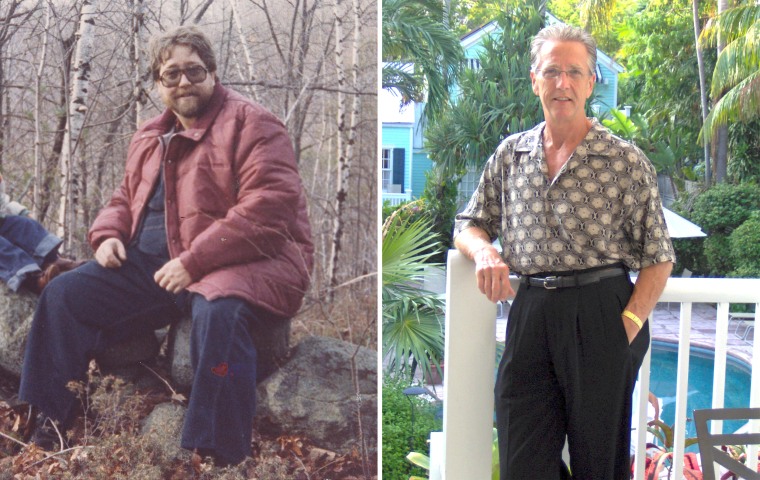In the mid-1980s, William Anderson lost 140 pounds in 18 months. The psychotherapist has kept the weight off ever since, but still eats whatever he wants, and looks forward to Thanksgiving.
“I’m going to have turkey and dressing and gravy and pumpkin pie, and all of those things, but it will be in the portions that I have become habituated to,” Anderson tells NBC News BETTER.
Anderson, who authored the popular weight loss book “The Anderson Method,” says he was obese from childhood until his mid-30s. He says finally losing weight after many years of struggle took more than willpower.
“I started to look at it as a behavioral problem, rather than a body problem or a diet problem,” he says, “and started to apply what we know works in terms of being able to change behavior.”
Here’s his advice on how to change long-term eating habits.
Before you diet, count the amount of calories you are currently eating
Most people only count calories when they are dieting, then go back to eating “normal,” says Anderson. But he says this way of thinking is backwards.
If you are going to lose weight and keep it off, Anderson says, you need to count the number of calories you currently eat.
Knowing how many calories you currently consider “normal” will deter you from falling back on old habits, he explains.
“If the ‘normal’ that you’re thinking of getting back to is the behavior that makes people overweight…what you’re doing is losing weight and planning to regain it again,” he says. “The main work that we need to do is not losing the weight — it is developing a way of living where you will not gain the weight.”
Forget about a number on the scale
All too often, people who want to lose weight are hyper fixated on reaching a certain number on the scale, according to the author. If that’s your goal, he says, you will likely change your eating habits and exercise routines until you achieve that number, then go back to your old ways.
“Losing weight is nice,” says Anderson. “It’s a great gift, but the main thing that people need to do is learn how to live in a way where they will not gain weight.”
Anderson says there are no fancy gimmicks to keeping a healthy weight: all you have to understand is the amount of calories you need to maintain it and stay in that range. It’s also important to be realistic, he says. If you enjoy a mostly sedentary lifestyle, how much you eat needs to reflect that.
“We need to look at what is the metabolic rate that I will have for the rest of my life for the way I want to live,” Anderson explains.
You can use this simple online calculator to understand how many calories you need to eat given your regular activity levels.
Eat what you enjoy
A recent study finds that people who maintain a low-carb diet after weight loss are likely to stay slim. While healthy eating is important, the behavioral therapist says it’s important to still enjoy foods you crave.
His first rule of thumb is to eat what you enjoy, but in smaller portions.
“I’ve learned to eat what I like in the portions that keep me from gaining weight, and I enjoy it more than the eating I used to do when I was overweight,” he says.
This “eat-what-you-like” rule goes against most conventional wisdom, he says, because people often believe they can give up certain foods for a stretch and then go back to their “normal” eating habits.
“This idea that I’m going to do something that I hate to lose this weight creates an aversion to doing it,” Anderson explains.
Instead, he explains, you need to reduce the amount you eat while still eating what you like.
“To create behavior, you have to associate reward with it,” Anderson says. “And if you do that on a daily basis, you’re going to get addicted to healthy habits, and that’s what we need to do.”
Time your meals
The number-one strategy Anderson employs to maintain a healthy weight is meal timing. He says he only eats at specific times during the day and fasts between meals.
RELATED: See how this woman lost 65 lbs through intermittent fasting.
On weekends, Anderson allows himself to eat more, but maintains a balanced caloric intake throughout the week. “It’s not a matter of just going crazy on the weekend,” he warns.
Losing 140 lbs and keeping it off has been life changing for the 69-year-old.
“To be able to solve that problem and feel good about myself and about my future, I mean, it’s just the best thing that’s ever happened in my life,” Anderson says.
MORE WEIGHT-LOSS SUCCESS STORIES
- How a spreadsheet helped this man lose 60 pounds
- These two economists used 'meta rules' to drop 120 pounds
- The 80/20 rule helped this woman lose weight
- Changing the way she talks about food helped this woman drop 10 pounds
Want more tips like these? NBC News BETTER is obsessed with finding easier, healthier and smarter ways to live. Sign up for our newsletter and follow us on Facebook, Twitter and Instagram.


